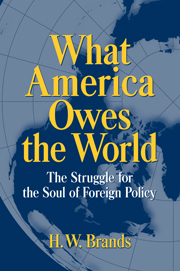Book contents
- Frontmatter
- Contents
- Preface
- 1 Exceptionalists All! The First Hundred Years
- 2 Brooks Adams: Marx for Imperialists
- 3 Walter Lippmann and a New Republic for a New Era
- 4 When the Future Worked and the Trains Ran on Time: Lincoln Steffens
- 5 Dr. Beard's Garden
- 6 Kennan, Morgenthau, and the Sources of Superpower Conduct
- 7 Reinhold Niebuhr and the Foreign Policy of Original Sin
- 8 God Blinked but Herman Didn't
- 9 On Wisconsin: Madison and Points Left
- 10 The Brief of Norman's Woe: Commentary and the New Conservatism
- 11 It Ain't Over till It's Over – and Not Even Then
- Note on Sources
- Index
1 - Exceptionalists All! The First Hundred Years
Published online by Cambridge University Press: 25 March 2010
- Frontmatter
- Contents
- Preface
- 1 Exceptionalists All! The First Hundred Years
- 2 Brooks Adams: Marx for Imperialists
- 3 Walter Lippmann and a New Republic for a New Era
- 4 When the Future Worked and the Trains Ran on Time: Lincoln Steffens
- 5 Dr. Beard's Garden
- 6 Kennan, Morgenthau, and the Sources of Superpower Conduct
- 7 Reinhold Niebuhr and the Foreign Policy of Original Sin
- 8 God Blinked but Herman Didn't
- 9 On Wisconsin: Madison and Points Left
- 10 The Brief of Norman's Woe: Commentary and the New Conservatism
- 11 It Ain't Over till It's Over – and Not Even Then
- Note on Sources
- Index
Summary
The exemplarists started the debate when John Winthrop proclaimed that the Puritan settlement on the Atlantic's western shore would be a model for the entire world. If the experiment in government by the godly succeeded, its light would illumine humanity; if it failed, all would know. Yet unalloyed exemplarism wasn't a necessary consequence of Puritanism per se. A more vigorous vindicator than Oliver Cromwell would be difficult to conceive. Had Winthrop and associates enjoyed the capacity to do what Cromwell did, they never would have left England. For Winthrop, exemplarism was the refuge of the weak.
It remained so for Americans for a century and a half. Until the inhabitants of Britain's North American colonies wrested sovereignty from London, they were in no position to impose their notions of politics, social order, or anything else on the world at large. To be sure, they leaned heavily on neighboring Indians and somewhat more lightly on the French, Dutch, and Spanish they encountered in the colonial borderlands. Yet without a national government, Americans had no foreign policy distinct from Britain's, and so small was their voice in the formulation of British policy that few bothered to raise it.
Though Thomas Jefferson didn't share many habits of mind with John Winthrop, the author of the Declaration of Independence agreed that Americans were uniquely placed to set a pattern for the earth's less favored denizens.
- Type
- Chapter
- Information
- What America Owes the WorldThe Struggle for the Soul of Foreign Policy, pp. 1 - 21Publisher: Cambridge University PressPrint publication year: 1998
- 2
- Cited by



